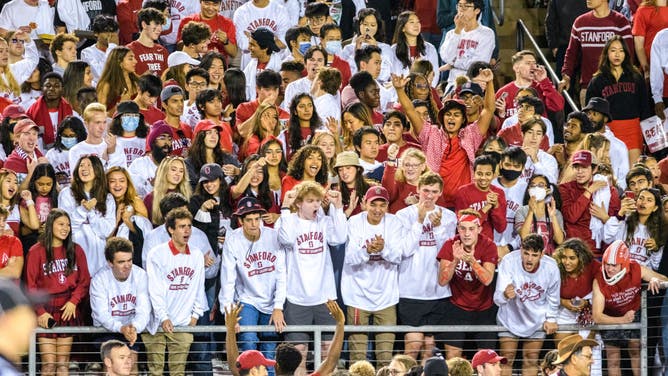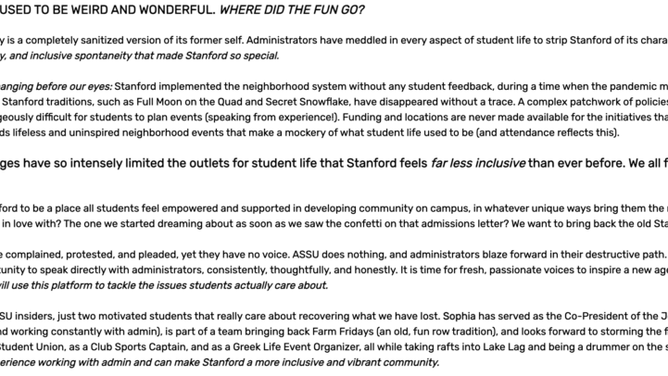Stanford Students Strike Back At University's 'War On Fun' With Blowout Election In Favor Of Social Life Revival
Stanford University students used their vote to fight against the school's recent 'War On Fun.' The movement led to a significant shift in the makeup of the Associated Students of Stanford University, which is essentially the university's student government.

Over the course of the past academic year, a large group of Stanford students pushed back on a suppression of social functions by university administration. Students claimed that the school repeatedly exerted pressure to restrict student social life through a lack of communication, an adversarial approach to party registration and funding, and strict policies.
According to multiple students, the new, excessively bureaucratic approach made it difficult to register on-campus social events with the university. It included, but was not remotely limited to, Greek life.
Numbers backed up that claim.
In 2019, the last school year without COVID-19 restrictions, 158 on-campus parties were registered with the university during the first month of the fall quarter. In 2022, just 45 parties were registered on campus during the first month of the fall quarter.
That trend continued throughout the year.
The school’s student newspaper The Stanford Daily provided a great look at the entire situation from a first-hand perspective. Tensions mounted over the university’s handling of social life and a larger movement began.
Stanford Hates Fun was born!
It started with a sign at a football game back in October.
Not long after the sign made its debut, with help from the Arizona State Sun Devil, Stanford suspended its Tree mascot over his participation in the on-field protest. His predecessor returned to the role after the suspension, so The Tree did not miss any time.
The university's decision to suspend The Tree only created a larger wave. Students continued to fight for their right to party by voicing their distaste with Stanford's suppression of social activities during a blowout loss to Washington State.
Security was all over it.
In wake of the decision, a group of students turned aim toward the administration.
Nothing especially pertinent ever came from the threat of legal action, and things went dark for awhile. It's because there was something bigger brewing under the surface.
Fun was, and is, striking back at Stanford.
Sophia Danielpour '24 sponsored a petition through the university on behalf of herself and Kyle Haslett '25 in regard to the Associated Student body's executive president. It was titled 'Sophia & Kyle: Fun Strikes Back' and it announced their candidacy for election.

Fun Strikes Back at Stanford
In addition to the petition, Haslett and Danielpour outlined their larger platform. The full, 11-page document is worth the read and goes on to list, in detail, four main focuses:
To summarize, Haslett and Danielpour wanted student feedback on how best to make big, sweeping change at Stanford University. Their efforts focus largely on "tackling the issues students actually care about" and bringing back the Stanford of old — the Stanford that used to be fun — in the process.
It is also worth noting that neither Haslett nor Danielpour have prior experience with/on the ASSU. The former is the social chair for Kappa Sigma, a member of the Black Student Union and a captain of the club lacrosse team. The latter is the Co-President and former Vice President of the Jewish Student Association and the Director of Fellowships of Stanford in Government.
They were the only executive slate where both candidates did not previously serve with/on the ASSU.
Their platform is well-thought out and it worked.
Preliminary results of the 2023 ASSU election were announced earlier this week. Elected candidates will serve in their roles during the 2023/24 academic year.
Voter turnout was about seven percent higher than the prior two years. It fell short of 2020's numbers.
39.44% of undergraduate students and 12.83% of graduate students cast ballots in 2023. 53.76% of undergraduate students and 23.02% of graduate students cast ballots in 2020.
Of those who voted during this election cycle, Haslett and Danielpour won big. They were elected as ASSU executives by a margin of nearly 19% of the total electorate over the second-place slate.
It was a blowout. Fun struck back at Stanford!